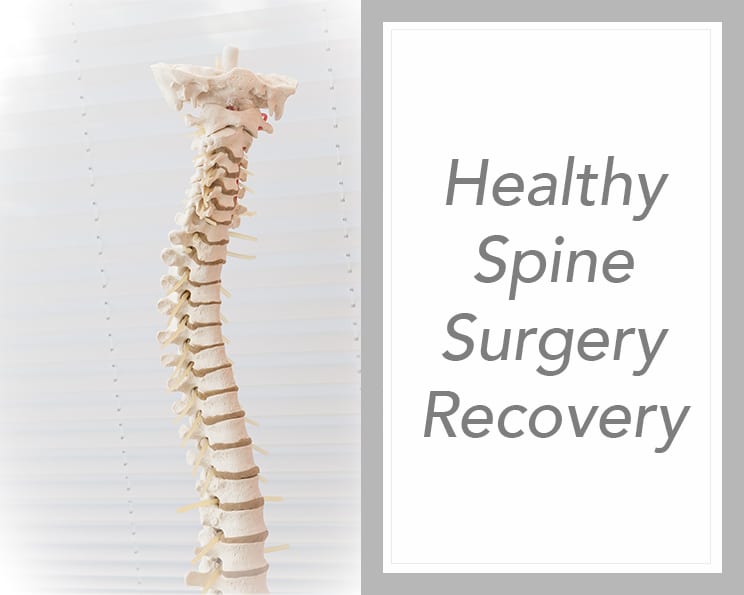After you’ve undergone spine surgery, you want to make your path to recovery smooth, painless and short. Preparing yourself with information and expectations will allow you to plan for after your surgery. Before going into surgery, you should already have your home ready, so you won’t have to do much during your recovery.
At NJ Spine & Orthopedic, we treat people, not patients. We want you to have a swift and effective recovery so you can get back to your everyday life. Here are some tips for how to make your recovery from spine surgery go as smoothly as possible.

What to Do Before Spine Surgery
Your home should be prepped with food, you should make advance sleeping arrangements and you should organize your house before you have your surgery. This way everything will be taken care of, so you can focus on your recovery when you return. Things to consider include:
- Food and Drink Accessibility. Stock your fridge and pantry with plenty of food and drinks. Ask your doctor if you need to follow a specific diet after your surgery.
- Stairs. Your doctor will probably inform you to avoid going up and down stairs for a while after your surgery. Bring whatever items you might want downstairs so you can access them.
- Sleeping Arrangements. If you can’t go upstairs, prepare a bedroom for yourself on the first floor. Put everything you need and want to make it as comfortable as possible. Include books, magazines and television, so if you’re told to stay in bed for a few days, you’ll have entertainment within reach.
- Organization and Fall Prevention. Maneuvering through clear, well-lit spaces will take stress off your recovery. Remove clutter to avoid possible injury from tripping or falling. Remove or secure carpet corners that might trip you. Night-lights should be in hallways, so you always know where you’re stepping.
What to Do After Spine Surgery
After surgery, you’ll need to know how to care for your wound and understand your limitations. Your first two weeks will be crucial to setting a precedent for your recovery. Do these five things to help the recovery go well.
- Set Realistic Expectations
Your body needs time and rest to heal. You will not be able to do any laborious, intense activities or resume working after surgery. Some surgeries take weeks to heal and others take months. Your surgeon will help you plan for the recovery process. - Avoid Showering Until You Get the All-Clear
Your wound will probably need to be kept dry for about a week unless your doctor tells you otherwise. When showering, it’s imperative that no water gets into the wound. Cover the wound with plastic wrap to keep water away. Someone should assist you the first time you shower after surgery. - Practice Smart Wound Care and Inspection
Your doctor will tell you when you can remove the bandage and how to wash it. For the first few days, you may need to keep your wound dry. You should be aware of abnormalities so when you check your incision, you’ll know if it’s healthy or not. If the area is red or draining fluid, is warm or the wound starts to open up, call your surgeon immediately. - Engage in Light, Manageable Activity
You should do some light and non-strenuous physical activity after your surgery. Sitting or lying down for extended periods of time may be detrimental to your back and prolong your recovery. Take short walks during the first two weeks of your recovery. Small and regular workouts reduce your risk of blood clots. After two weeks, increase your walking distances in small increments. - Do Not Do Any Intense Activity
You shouldn’t swim or run after your surgery. Your surgeon will tell you when you can resume intense activity. This also applies to everyday life. Don’t lift heavy vacuums, get on your hands and knees, or bend at the waist to pick something up. A tool that might help you is a grabber, so you don’t risk hurting your spine if you need to pick up an object or get something down from a tall shelf.

Safe Actions After Spine Surgery
You will have to adjust your lifestyle during your recovery period. Remember that this process is temporary and your surgeon planned it so you fully recover and then enjoy your life without back pain. Go over some safety exercises with your surgeon, so you know how to navigate your home securely. Also remember these things.
Go Slowly to Get Up Safely
When you’re getting up and down from a chair, you have to move slowly, so you don’t twist around or strain a muscle. For getting out of a chair, follow this method:
- Get to the edge of the seat.
- With your legs apart so they can support you, lean forward and put your hands on your thighs.
- Lift using your legs, and don’t push off with your hands.
Sitting down requires similar concentration. Back up so your legs touch the edge of the chair when you want to sit down. Lean forward and put your hands on your thighs as you did for getting out of a chair. Bend your knees and slowly sit down.
Adjust the Way You Get Ready Each Morning
When you’re getting dressed, wear loose-fitting clothing. Lying on your back might simplify putting on pants, underwear and socks. Get shoes that slip on, so you don’t have to worry about bending over to tie laces. Bend your knees and keep your back straight when you wash your hands or brush your teeth.
Stay Conscious of Back Safety
Go over what you can and cannot lift. You shouldn’t lift above your head until your back heals. If you lift any objects at all, they should not be more than 5 pounds.
Practice Strength Exercises
Ask your doctor for exercises that will strengthen your back. These exercises will help you return to an active lifestyle and prevent future chances for pain or injury. When your doctor clears you to do them, you’ll be able to start building back strength as soon as possible. Another avenue you could consider is physical therapy. A professional could help you create a unique plan that works for you.
Follow Driving Limitations
You cannot drive for two weeks after surgery. Start driving after your surgeon has cleared you. As a passenger, you should go on short trips. If you have to be in the car for a long time, stop every half hour to stretch.
Contact Your Surgeon When Problems Arise
If you have a fever, more pain or numbness in your limbs or difficulty breathing, get in touch with your surgeon immediately. Call even if you have the slightest inclination that something is wrong. It’s better to be cautious.

Stay Healthy After Spine Surgery
Your safety after surgery is imperative to have a successful recovery, and so is your health.
Some lifestyle changes could help you have a faster recovery and lead you into a more healthy and active life when you’re fully healed. Consider making the following lifestyle changes:
Stop Smoking
Smoking should be avoided leading up to and after surgery. It slows down the healing process because nicotine can deter bones from growing to fuse correctly.
Avoid Consuming Alcohol
You will probably receive a prescription for pain medication after your surgery. This should not be mixed with alcohol. There could be an adverse reaction or increased sedation. You don’t want to be consuming a beverage that’s a depressant. It’s best to stay alert and upbeat so you can make the best decisions and have a positive mindset.
Get Enough Sleep
Keep a regular sleep schedule of eight hours a night. This will help your body heal and maintain your mental health.
Manage Your Weight
Maintaining a healthy weight puts less pressure on your back. It will also make maneuvering easier after surgery.
Eat a Healthy, Varied Diet
Part of maintaining a healthy weight is following a healthy diet. Eating highly nutritious foods will help you recover more quickly, and you’ll feel better. They can also keep your body on a regular schedule. Some medicine that patients get after surgery causes constipation. A diet that includes foods rich in fiber will help with those side effects. Foods such as whole-grain breads, fruits and vegetables are all high in fiber. Whole grain breads tend to be darker than regular bread. Other things to include in your diet are:
- Antioxidants. Look for deeply colored fruits, because they are rich in antioxidants. Blueberries, blackberries, raspberries and pomegranates will help with reducing harmful molecules in your body.
- Protein. This helps tissues repair, which will help your wound heal more quickly. When your body digests protein, it takes the amino acids and rebuilds torn tissue. When you undergo surgery, you’re going to have to add some extra protein to your diet to help your body heal the wound.Lean proteins include eggs, turkey and beans. Black beans are an alternative to meat, and they have low sodium levels. Quinoa is a high-protein grain that has fiber, protein and antioxidants.
- Nuts and Seeds. High in protein and zinc, nuts will help your wound heal and boost your immune system. Almonds are protein-rich nuts and sesame seeds contain a lot of zinc.
- Citrus. Vitamin C supports collagen, the protein that heals wounds. Citrus fruits are rich in vitamin C. Oranges, grapefruits, lemons and tangerines are good sources of vitamin C. It’s important to have a strong citrus intake after surgery because stress can reduce your body’s vitamin C levels. Other vitamin C-rich foods are kiwi, kale and broccoli.
- Vegetables. They are high in fiber and boost your immune system, which will help your body fight off possible infections after surgery. Look for cruciferous vegetables, like Brussels sprouts, kale, cauliflower, broccoli and cabbage.
- Dairy. While too much dairy could cause constipation, plain Greek yogurt is a low-fat, high-protein snack option. Watch out for yogurt that already has fruit mixed in because it contains added sugars. If you want to sweeten up your yogurt, mix in some of your own fruit. You can create a snack high in protein and antioxidants.
- Soy. Foods with soy contain many vitamins that help your digestive and immune systems and promote tissue growth. Adding soy into your diet takes a few small changes at the grocery store. Try soymilk and soy creamer for your cereal and coffee.
- Dark Chocolate. There’s still some room for sweet snacks in your post surgery diet. Dark chocolate will help your wound heal because of how it promotes healthy blood pressure levels. Your body can send plenty of oxygen and vitamins to the wound. Dark chocolate also has antioxidants that help your immune system.
Eat Regularly After Surgery
You have to make sure you’re getting enough nutrients and calories after surgery so you can give your body what it needs to recover. Some people might not feel hungry after undergoing surgery, but small tricks can help you get to the caloric level you need, such as:
- Graze. Eat throughout the day. When you’re in between meals, a handful of nuts can help you get the nutrients and calories you need.
- Supplements. Add protein bars or protein-rich drinks to your diet. You’re eating foods that are doing more for you instead of eating more foods.
- Add Snack Times. Build snack times into your schedule. Mid-morning, midafternoon and before bed could be times to add a healthy snack to your diet.
- Set Reminders. If you’re having trouble remembering to eat, you can set alarms on your phone or write out reminders in a daily planner to ensure you get the right amount of nutrients for the day.
Always Practice Good Posture
Use ergonomic chairs that offer lumbar support and put you in a healthy posture, keeping your spine in alignment. Slouching in unsupportive chairs puts unnecessary strain on your back. Watch out for when you’re on your phone or reading, as you can crane your neck down for long periods of time. This puts extra strain on your neck and spine.
Keep your phone or book at eye-level when you’re using them. Your mattress should be supportive, too. It should be at medium firmness. A mattress that is too hard will put pressure on your lower back and tighten your muscles. Soft mattresses don’t support your spine and allow it to curve, which could misalign it.
Taking Care of the Spine After Surgery
You want to make sure you reap all the benefits of spine surgery, so make sure to follow these simple tips as well.
If you sleep on your back, put a pillow under your knees. Sleeping on your stomach will put stress on your back. You might want to elevate your upper body while sleeping. Avoid naps throughout the day because they could disrupt your sleep cycle and limit your movement throughout the day. Regularly stretch your muscles and walk around.
Talk to your surgeon about getting a brace for your back. They help speed up the recovery process and could potentially reduce pain after surgery. Braces help keep your posture healthy and make sure your spine remains aligned as it heals. There are two different types:
- Rigid Braces. These plastic braces limit about half the motion in your spine. They are heavier than the corset braces, and you don’t need to wear them when you’re sleeping.
- Corset Braces. Elastic braces prevent you from leaning forward and promote bone growth and fusion.
At regular intervals, you will meet with your surgeon to see how your recovery is going. At these meetings, they will be able to tell if you need to make any changes. If your recovery goes as planned, these check-ins will happen less frequently as more time passes and your body heals.
How to Best Recover From Spine Surgery? Follow Your Plan
It might be tempting to deviate or cheat on your recovery plan, but remember to think about why you’re following these steps. Each component is there to help you recover correctly and efficiently and get back to enjoying your everyday life. If you have any questions along the way, we urge you to get in touch with NJ Spine & Orthopedic. We can address your concerns and keep you on the path to a full recovery.


